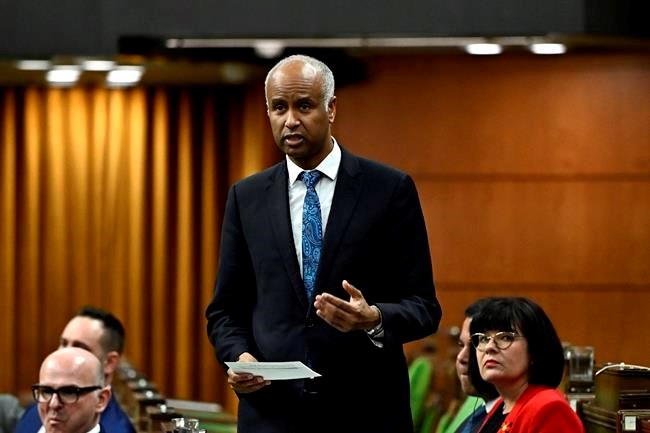Here is a roundup of stories from The Canadian Press designed to bring you up to speed on what you need to know today...
Liberals buck global trend in raising foreign aid
Foreign aid groups are hailing the federal Liberal government's return to a policy of increasing humanitarian and development spending each year while asking for a plan to push allies to reverse a global decline in aid.
"It was a good moment for Canada to step up and show global leadership by making this commitment of additional, new humanitarian money," said Kate Higgins, the head of Cooperation Canada, which represents more than 100 non-profits.
The Liberals pledged in their Tuesday budget to increase humanitarian aid by $150 million in the current fiscal year and $200 million the following year.
International Development Minister Ahmed Hussen would not confirm the total amount of Canada's foreign aid, though Higgins pegs that total at just over $7 billion this year, and $7.2 billion next year.
New housing supply constrained by labour shortage
Solving a longstanding construction worker shortage will be key to boosting housing supply, experts say, as Canada's national housing agency continues to forecast housing start levels that fall short of growing demand.
The growing construction labour shortage was cited by the Canada Mortgage and Housing Corp. as one of three factors contributing to longer construction times in a housing supply report last month.
Along with larger project sizes and increasing costs, the agency said workers are retiring faster than they're being replaced. The pandemic worsened this challenge when some construction workers changed careers or retired prematurely rather than returning to the industry as the economy reopened.
"It's been the monster in the woods for a long time. We've known this is coming," said Jordan Thomson, senior manager of infrastructure advisory at KPMG in Canada.
Thomson said the industry is facing the dual challenges of replacing workers as they retire and growing the sector to address Canada's rising need for homes.
Lachine Canal users trash removal of garbage bins
On warm days, Montreal's Lachine Canal can attract thousands of picnickers, cyclists and pedestrians.
But since Parks Canada recently removed around 30 trash bins from the paths along the historic waterway, Ariana Ranjbar says she has begun to notice a new phenomenon at one popular lawn.
“I started noticing a lot of poop bags building up," Ranjbar, 26, said on Wednesday alongside the canal in Montreal's Griffintown neighbourhood. In her hand, she held a plastic bag full of her dog's excrement. Steps away, four such bags sat on the ground, and a fifth dangled from a nearby tree.
"I don't like when people don't pick up or do leave garbage around," she said. The decision to get rid of garbage cans, she added, "is a way of probably accumulating garbage and/or deterring people from the area."
In a message posted to Facebook on Friday, Parks Canada said the removal of the garbage bins is meant "to encourage citizens to take responsibility for the management of waste destined for landfill sites."
Why few Indians in Canada will join giant election
Parmod Chhabra is deeply invested in the Indian general election that gets underway on Friday, with almost a billion people eligible to vote, but he won't be casting a ballot.
Nor will the vast majority of the overseas Indian community in Canada.
The reasons are simple. India requires overseas citizens to travel back to their home electorates to vote in person on polling day. There is no option for postal or electronic voting for the general overseas population, and people like Chhabra lose eligibility because they also have foreign citizenship.
"I will suggest there's a very small number of people who are going to go back to vote," said Chhabra, president of the India Canada Association community group in Ottawa, citing the roughly 14-hour flight from either Toronto or Vancouver and round-trip fares around $2,000.
"If it was close enough, like a three-hour or four-hour flight, I will bet you there will be hundreds of thousands of people going," he said. "The interest level is very high, but this cost and the time which it takes to get there, that is prohibitive right now."
Indian authorities say about 969 million people have registered to vote in the 44-day general election, creating a massive electorate of about 12 per cent of the global population for the biggest election in history.
Prison guards in B.C. to protest rise in violence
Around 100 members of the Union of Canadian Correctional Officers plan to hold a protest in Abbotsford, B.C., today.
The demonstration outside the Pacific regional headquarters of the Correctional Service of Canada aims to highlight the violence faced by its members, who often sustain injuries while on the job.
John Randle, one of the union's regional presidents, says there has been a significant increase in violent incidents against guards across the country.
In a statement released yesterday, the union noted that its officers are frequently subjected to assaults, resulting in physical and mental injuries.
Plant-based sector looks to improve amid inflation
The plant-based protein industry is focused on improving the price, taste and texture of its products as it weathers a period of consumer wariness brought on by the rising cost of living.
That’s according to industry experts, including Bill Greuel, CEO of Protein Industries Canada, who says there’s a lot of work being done in Canada to improve things like the meltability of plant-based cheese and the texture of plant-based meat.
Greuel says inflation and higher interest rates have made consumers more sensitive to price differences and, therefore, less willing to try plant-based meat alternatives.
He says the industry needs to build up its manufacturing and processing capacity in Canada to help address the price differences between plant-based meat and its conventional counterparts.
---
This report by The Canadian Press was first published April 18, 2024
The Canadian Press




